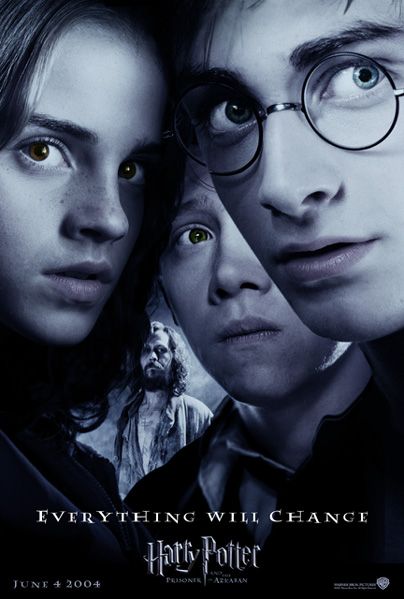|
To be more precise, here we'll write reviews
of the 5 books of the MAGICAL & GREAT Harry Potter series. ENJOY!
A review of all
the books from the Harry Potter series:
The
genius behind J.K. Rowling’s Harry Potter series is manifold and delightful. In the creation of a wondrous world (the
Hogwart’s School of Wizardry, and a world of magical beings hidden from non-magical, “muggle” eyes), we
meet a downtrodden but victorious sympathetic hero -– an orphan in the Dickensian tradition. Harry Potter starts out
a lonely, goodhearted, courageous boy who is learning his true calling on his journey of growing up. The series uses the timeless
morals of good (Harry and Professor Dumbledore) triumphing over evil (Lord Voldemort & the Death-Eaters); open-mindedness
(the Weasleys), winning over ignorance (the Dursleys). There are also those themes essential to young adult literature: finding
one’s identity, and the theme of children on their own. The smooth writing style also makes these books an enjoyable
read for all.
At series start, Potter's genial good nature and kindness to others amasses him friendships that later
come in very handy in a pinch, for example, when Harry was being saved by the timely aid of Hagrid the gamesmaster, Dobby
the House Elf, and the ghosts Nearly Headless Nick and Moaning Myrtle. But Harry has no motive behind his kindnesses save
compassion and doing right; it's in his nature.
In the Hogwart's School of Wizardry, each book brews plots of supernatural
trouble (generated by the Dark Lord and his followers) that threaten not only the school's but the wizardry world’s
existence. But then -- unwittingly and almost unwillingly -- Potter comes to the rescue. Because he's a good person and cares
about others, and will work to save people at all costs, he always acts heroically and does the right thing instinctually.
As social satire, I can’t help but marvel and laugh: the send-up of the civil service, the way class snobbery
is dealt with especially with regard to the Ministry of Magic and the awful people who run it. Especially amusing in book
5, Harry Potter and the Order of the Phoenix, is that new Defense Against the Dark Arts teacher, Professor Umbridge
with a personality like poisoned honey. I also love the satirical digs against small-minded bourgeoisie typified by the keeping-up-with-the-Joneses
Dursley family. But, just when you think a character is all bad (or all good), Rowling turns the tables and shows how people,
even magical ones, have many facets indeed.
The Harry Potter series of books works on many dimensions, qualifying it
as a mythic-journey in the Joseph Campbell tradition (the hero’s journey) -– or, if you will, a Tolkeinesque one
(Harry as Frodo). I would heartily agree that this serendipitous arrival at certain moral truths is usually incidental and
probably not due to the author's intention. Few writers set out with an ironclad moral or theme: They just want to tell the
most riveting, interesting story, having fun themselves along the way. The plot, characters, and theme all start to come together
as the writing progresses as part of the writer’s journey. Harry Potter books work on many levels: psychological, moral,
spiritual and as social satire. Their genius lies in their wonderful plots, vivid characters, and how much fun they are. Small
wonder they’re so popular.
In fact, their great popularity is the main reason I am a latecomer to the cult of
Potter. Two years ago, I read the first in the series, Harry Potter and the Sorcerer’s Stone. In the past six
months, I have listened to the second, third, and fourth as books on tape (they are absolutely riveting to listen to while
driving around). I’ve enjoyed both movies, but especially the 2nd, Harry Potter and the Chamber of Secrets.
Now,
with book five in the series, Harry Potter and The Order of the Phoenix, we start to see the darker side of Potter
-– the part that he shares with Lord Voldemort. As one friend commented, “Now he’s becoming a bratty teenager.”
Even though Harry, growing up, isn’t quite as adorably likeable to either his friends and family or us, the readers,
we sympathize with him because, growing up is tough! Harry definitely has issues... his anger and confusion are coming to
the fore, and they're not pretty.
Harry Potter books also have the power to stoke (or engender) Anglophilia. England
(and the Potter world) has a strict social class and lineage system, hence the constant comparison of the rich and snobby
Malfoys contrasted against the humble but accepting Weasleys -– both “purebloods,” but the Weasleys aren’t
bothered by wizards of non-pure blood. Besides, often the “pureblood” wizards (the generally arrogant, noblesse
oblige types) are often pitted against muggle-born or “mudbloods” (e.g., honor student and Harry’s friend
Hermione Granger, besides non-magical humans). Although unrelated really to the theme of the journey, these sorts of distinctions
mark the Potter books as seeming peculiarly English.
The series opens with Harry Potter, at the (magical) age of 11.
An adopted, abused orphan, Harry lives with an aunt, uncle and cousin (The muggle Dursleys) who are almost unbelievably mean-spirited
and stupid -– and who mistreat Harry constantly. A godsend comes in the form of an invitation to the Hogwart’s
School of Wizardry -– the place where he belongs. But along this journey of discovering who he is, who his parents were,
and what his purpose in life might be, almost everybody recognizes “the famous Harry Potter” as a miraculous survivor
of a terrible dark wizard’s wrath. Lord Voldemort disappeared for eleven years but keeps trying to return –- mostly
so that he can obliterate the last Potter, Harry. I can see an almost Star Wars-like conflict, similar to Luke and Darth Vader
(Good vs. Evil, Light vs. Dark, Life vs. Death . . . the usual major tensions and conflicts).
Not only is Harry famous,
he was left a small fortune in the wizard’s bank, Gringott’s, by his murdered parents. Even though Harry would
have done anything to prevent their murder, live as a normal family with them and not be a famous and independently wealthy
young man, his destiny is otherwise, and as the ancient Chinese curse goes, he lives in interesting times.
Efforts
at censorship aside, I definitely believe in the moral dimension in the physical journey of fantasy books, especially in the
work of J.K. Rowling. This noble aspect, in combination with their popularity, make the Harry Potter series a golden stroke
for lifelong love of reading, creating a new generation of proficient if not avid readers. Since the Harry Potter series of
books have become so wildly and widely popular, they’ve been making reading cool again. Besides, being so enjoyable
as well as engaging, it’s hard to put down one of these books until the end.
-Lubna,
Stefanie & Kirthana.
Source: Litkicks.com
|
 |
|
Favorite Book:
In
this area, we'll display votes people have mailed us as to which book do they find the most interesting. For more details
about where to vote, log on to the 'Contact Us' Page of the website.

|
| Everything will change |
|
 |
|
|
 |
|
|
|

